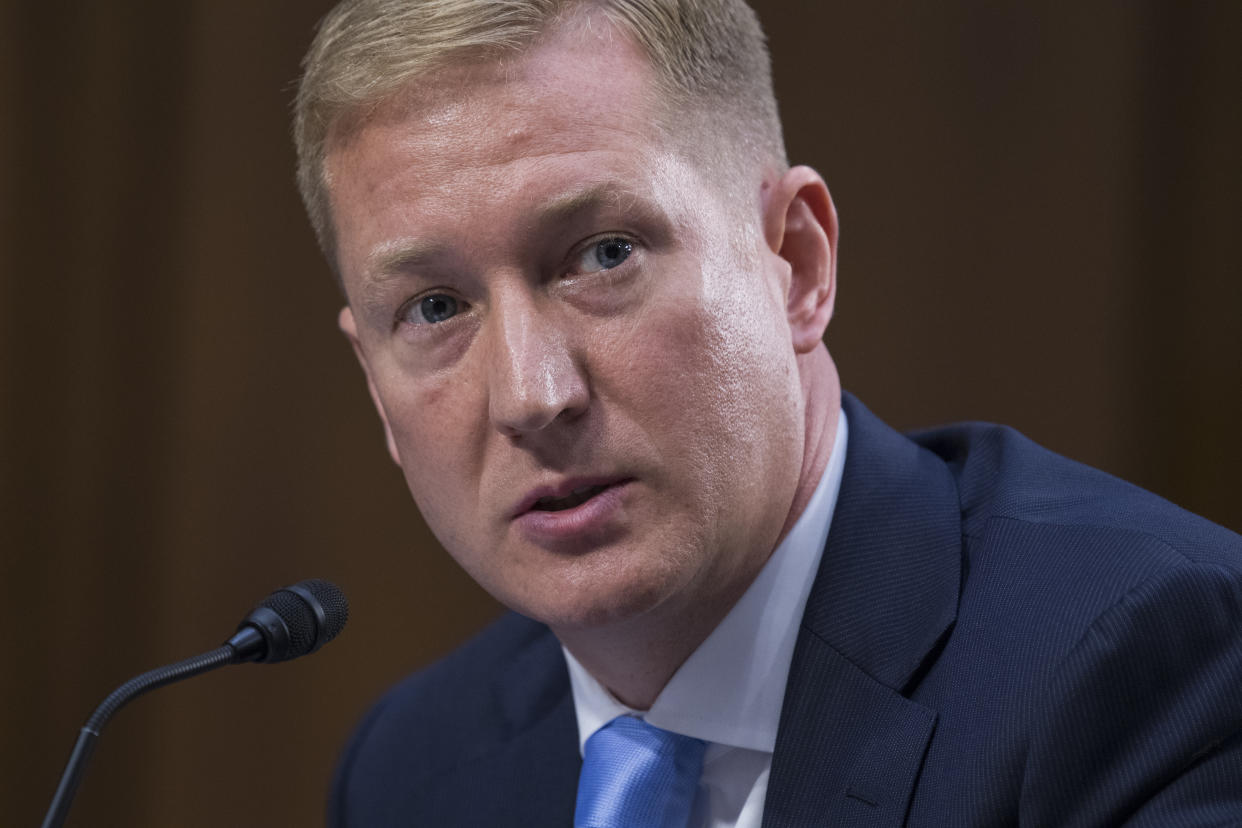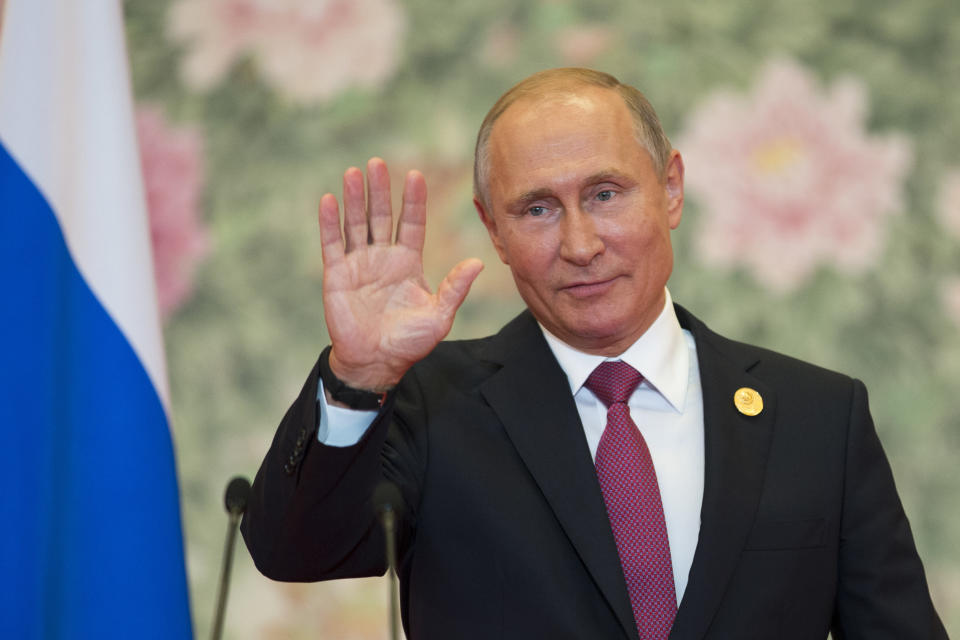As North Korea danger recedes ever so slightly, renewed Russian threat looms

As the world anxiously watched the summit between President Trump and North Korean leader Kim Jong Un in Singapore, American legislators and national security officials focused on another nation that poses a threat to global stability: Russia.
The Senate Judiciary Committee convened a hearing Tuesday that focused on the uneasy realization that Russia, emboldened by its ability to alter the results of the 2016 U.S. presidential election, is almost certain to try again in the 2018 midterms.
One of the witnesses, former homeland security adviser Kenneth Wainstein, asked the legislators arrayed before him to put aside their political differences and unify to beat back future Russian intrusions. “We are facing an unprecedented and growing threat to our democratic institutions both here and around the globe,” Wainstein said.
But for many Democrats, the Trump administration has simply not acknowledged the extent of the danger — or its source. Sen. Richard Blumenthal, Democrat of Connecticut, pressed deputy assistant attorney general Adam Hickey on whether he agreed that Moscow had “committed an act of war” — and would do so again unless “the United States makes Russia pay a price.”
“We have to find ways to raise costs of malicious and malign behavior by foreign states,” Hickey acknowledged, though he did not elaborate on what those measures might be. More troublingly, Hickey dodged a question from Patrick Leahy, D-Vt., regarding the allegation of some 5 million illegal votes cast in the 2016 presidential election. President Trump believes that there was rampant fraud in Democratic states like New York and California. That belief is unfounded.
Hickey did promise that that the Department of Justice would publish a report on “foreign influence operations” by mid-July. Despite the president’s hesitation to name Russia as the world’s premier cyber culprit, the Trump administration has levied sanctions on some wealthy Russians. It has closed Russian consulates in the United States and expelled Russian diplomats, but the Kremlin has given no indication that it was especially perturbed by these measures.

Other witnesses at Tuesday’s hearing suggested that defensive measures, not retaliatory ones, were best equipped to inoculate the American body politic against a Russian attack. “The best response to those who wish to undermine faith in our democracy is to participate and to vote,” said Matthew Masterson, a high-ranking Department of Homeland Security official tasked with overseeing election integrity at the agency. Deviating from the otherwise pessimistic mood of the hearing — and of the broader discourse about the electoral process in the national media — Masterson expressed confidence in state and municipal officials who he said are working to ensure that the nation’s 11,000 election systems are safe.
“Every state I travel to, state official I talk to, is taking this seriously,” Masterson said before an overflow crowd in the hearing room on the second floor of the Dirksen Senate Office Building. Notably, there were plenty of seats left on the Republican side of the bench, with only Charles Grassley of Iowa, who chairs the committee, present. The absence of other Republicans only underscored how divisive the issue of Russian electoral meddling remains; when Dianne Feinstein urged fellow legislators to “put aside politics and act decisively,” she was speaking almost entirely to members of her own party.
After testifying before the committee, Nina Jankowicz, a Kennan Institute scholar who has spent the last several years advising the Ukrainian government on how to counter Russian disinformation campaigns, told Yahoo News that the United States needs a “generational solution” that will make Americans less susceptible to fake news and other forms of manipulation. She pointed to Finland and Sweden as two nations that have done especially impressive work in educating their citizens in this regard. It is work, however, they have been doing since the end of World War II.
For now, Jankowicz hopes that every election board in the nation should make sure that electronic voting records are bolstered by a paper trail of tamper-proof records. She also believes, like Hickey of the Justice Department, that a “credible threat of retaliation” should be presented to the Russians, lest they think of launching another misinformation campaign in November. Lastly, she would “enlist credible third parties,” such as technology companies, to explain to Americans how voting works, since a broad confusion about the electoral process is what makes that process potentially ripe for exploitation.
“It’s mush,” she said. “It’s hard for Americans to wade through that.”
The congressional hearing came days after one of the nation’s top intelligence officials offered a remarkably frank assessment of the Russian situation. Speaking on June 8 in Normandy, France, as part of an event titled “The Tocqueville Conversations,” Director of National Intelligence Dan Coats expressed concern about “Russian targeting of American society in ways that could affect our midterm elections.”
Coats also noted that Russia has had plenty of opportunities to hone its disinformation tactics since the 2016 election by attempting to sway elections in France, Germany and Norway, as well as the separatist movement in the Catalonia region of Spain.
“These Russian actions are purposeful and premeditated and they represent an all-out assault, by Vladimir Putin, on the rule of law, Western ideals and democratic norms,” Coats said. His remarks came on the same day that Trump said that Russia should be welcomed back into what is now the G-7 group of countries, underscoring the divide between an intelligence community that sees Russia as a foe and a president who looks longingly towards the Kremlin.
__________
Read more from Yahoo News:
Obama official: ‘We should have done more’ on Russian interference in 2016 election
Sage grousing: Senators charge Interior is holding up conservation grants
California’s Gavin Newsom wants to lead the way to a post-Bernie, post-Hillary party
The Eighth Circuit strategy: How abortion foes are lining up cases to challenge Roe
Bai: Not much intelligent life in Washington. Outer space is another story.
Photos: Historic summit between Trump and North Korea’s Kim in Singapore



